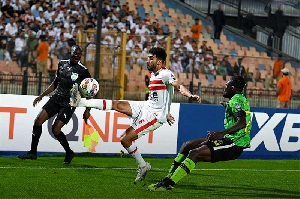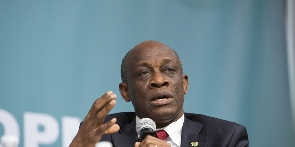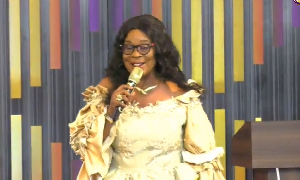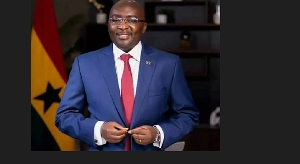- Home - News
- TWI News | TV
- Polls
- Year In Review
- News Archive
- Crime & Punishment
- Politics
- Regional
- Editorial
- Health
- Ghanaians Abroad
- Tabloid
- Africa
- Religion
- Election 2020
- Coronavirus
- News Videos | TV
- Photo Archives
- News Headlines
- Press Release
General News of Monday, 3 August 2009
Source: GNA
Government reverts to three-year SHS
Accra, Aug. 3, GNA - Cabinet has approved the proposal to revert to three years of Senior High School (SHS) education from the present four years, Mr Alex Narh Tettey-Enyo, Minister of Education, announced on Monday.
He said the 2007 and 2008 batches of students who had already been admitted to do four years in Senior High School (SHS) would, however, continue with the four-year programme.
In an interview on the duration of SHS that had created considerable public furore in the country, Mr. Tettey-Enyo said the four-year programme was not the solution to poor performance in some schools.
"What we really need to do now to improve on our educational standards is to strengthen the Junior High Schools with qualified teachers and infrastructure to lay a good foundation for the students at the Senior High Schools, rather than increase the duration to four years."
The Minister, who is also the Member of Parliament for Ada, said in order to avoid legal battles, the document would be sent back to Parliament for amendment and approval before it could be implemented. He said the government would strengthen the Junior High Schools by providing adequate infrastructure and teachers, textbooks, in-service training programmes and incentive packages for teachers to put up their best in schools.
Mr. Tettey-Enyo said plans were advanced to provide adequate classrooms and qualified teachers in schools to tackle the current loopholes in some parts of the country, and urged teachers to work relentlessly towards achieving better results in the coming years. On whether the names of Junior High Schools and Senior High Schools would be reversed to Junior Secondary School and Senior Secondary Schools respectively, the Minister said that was not paramount.
"We are interested in the duration involved, but as to whether we should change the names would be considered in subsequent discussions." He said although the former administration adopted the Anamuah Mensah Report on education, it failed to implement the three-year duration, but came out with a white paper on four-year duration. "But we still believe that students will be able to manage all the syllabi within three years and therefore four years will be too much for them," he said.
The Junior Secondary School (JSS) system, which had six years at basic level and three years at JSS, was introduced in 1987 to replace the middle school system which had six years in primary school and four years in middle school.
The three-year Senior Secondary School (SSS) system also replaced the seven-year secondary school system comprising five years for the ordinary level and two years for the advanced level.
The JHS and SHS were recommended in 2007, whereby the duration of the SHS was to be increased from three years to four years but this generated a lot of public debate, necessitating the government to organise a national forum on the duration of second cycle education last May, to obtain a national consensus.
Those in support of the four-year duration were of the view that increasing the number of years would help reverse the high number of students who were currently unable to qualify for the universities and other tertiary institutions.
On the other hand, the proponents of the three-year programme maintained that the dismal academic performance at the Senior High school level did not lie in the extension of the duration. Rather, they argued, problems such as inadequate infrastructure and teacher motivation needed to be addressed at the basic level in order that the current weak foundation could be corrected.
Advancing arguments for the four years, Professor Ivan Addae-Mensah, Former Vice-Chancellor of the University of Ghana, said the issue of cost, which was often cited by those in favour of the three-year programme, was not tenable.
He said it was important for the country not to sacrifice quality of education at all levels on the altar of cost.
Prof Addae-Mensah said retaining the four-year programme would enable schools to admit all students not directly into specific subject or course areas, but into the same general course level where all students studied the basic core subjects.
In this direction, he said, those from weaker Junior High School (JHS) background would also have some time to make up for any deficiencies, especially in English, mathematics and science. Students can then select their subject areas during the second or third year when they had a better grasp of the senior high school subjects.
"This will give every student a broad and strong base and long enough period to enable them to make up their minds as to what their talents really are," Prof Addae-Mensah added.
According to him, the four years were meant to give students a longer period to meet the requirements of the West African Examinations Council syllabus.
While appreciating the genuine concern that the lack of requisite facilities for the current changeover could affect the programme, Prof. Addae-Mensah said it was difficult to accept this on academic grounds as a good enough reason for reverting to the old three-year programme.
However, Mr Emmanuel Acquaye, an Educationist, held the view that the problem of high failures at the Senior High School level stemmed from poor preparation at the basic level, leading to a weak foundation. He attributed the weak foundation at the basic level to inefficiencies in the basic school curriculum, the overloaded nature of the curriculum of the various subjects, and slow response to the rapid growth of school enrolment and its associated large classes.
To Mr Acquaye, therefore, increasing the duration of the SHS by one more year would not solve the problem but would rather ignore the causes of the problem and prolong the finding of solutions to them. He called for the establishment of oversight structures such as the National Inspection Board to enforce standards at the first and second cycle institutions.
Another argument is that once Ghana was writing the West African Senior Secondary Examinations with other West African Countries that were spending three years in SHS, it was only fair to revert to three years and improve on the existing infrastructure.










